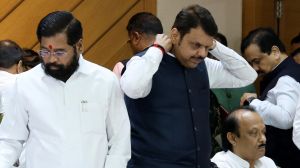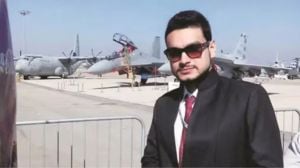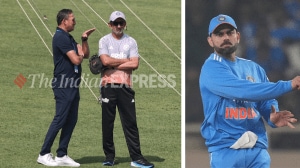Siddaramaiah govt in a bind over caste survey report as Lingayat, Vokkaliga blowback looms
Congress govt also faces pressure from backward and vulnerable groups to accept the survey report to be submitted by BC panel, which has been hanging fire since previous Siddaramaiah regime
 Karnataka Chief Minister Siddaramaiah during an event organised for celebrations of 'Karnataka Rajyotsava', at Sree Kanteerava Stadium in Bengaluru, Wednesday, Nov. 1, 2023. (PTI Photo)
Karnataka Chief Minister Siddaramaiah during an event organised for celebrations of 'Karnataka Rajyotsava', at Sree Kanteerava Stadium in Bengaluru, Wednesday, Nov. 1, 2023. (PTI Photo) The Siddaramaiah-led Congress government in Karnataka has been facing demands from the Lingayat and Vokkaliga communities not to accept the socio-economic and educational survey, also known as caste survey, whose report is expected to be submitted by the Karnataka State Commission for Backward Classes (KSCBC) by the end of this month.
On the other hand, sections of backward and vulnerable communities as well as the Congress party have been putting pressure on the Siddaramaiah government to accept the report and make its findings public.
This state-wide survey, commissioned in 2015 by the previous Congress government led by Siddaramaiah, was completed by the KSCBC in 2017 before being put into cold storage ahead of the 2018 Assembly polls as the party feared its political repercussions.
The succeeding governments – including the Janata Dal (Secular)-Congress coalition regime led by H D Kumaraswamy and the BJP government led by B S Yeddyurappa and later by Basavaraj Bommai – also continued to sit over the report for the next five years.
Last week, the Vokkaligara Sangha held a meeting in Bengaluru, during which it urged the government to reject the caste survey report. The meeting saw Deputy Chief Minister and state Congress president D K Shivakumar, who belongs to the Vokkaliga community, in attendance.
The Vokkaligara Sangha event was attended by the representatives of all parties as well as the seers of prominent mutts. It has decided to send a delegation headed by the pontiffs of various mutts to meet CM Siddaramaiah with their demands.
A week later, on Thursday, a Lingayat body, All India Veerashaiva Mahasabha, also held a meeting in Bengaluru, taking a similar decision to ask the government not to accept the caste survey report.
Veerashaiva Mahasabha president and Congress MLA Shamanur Shivashankarappa alleged that the survey was “unscientific” and had several “flaws”. “It (survey) is not scientific. They have sat here and written the report. They did not visit any houses,” he charged, adding that the survey was conducted by the KSCBC eight years ago. “Our opinion now is that a new census should be conducted.”
Karnataka Backward Classes Minister Shivaraj Tangadagi said the government would wait for the report to first go through its findings. “The census was carried out to find out the educational and economic status of all communities in the state.”
The survey was carried out under the chairmanship of H Kantharaj at a cost of Rs 162 crore during Siddaramaiah’s first tenure as the CM. The release of its report has since been hanging fire as successive governments have been wary of the backlash from leaders and legislators representing Lingayats and Vokkaligas, which are the state’s most dominant communities, especially in terms of electoral representation.
While Lingayats have a large presence in Central and Northern Karnataka, Vokkaligas are concentrated in Southern Karnataka. Though they have been considered for long as the two most populous communities, leaks of some of the findings of the survey report have contested these claims, pegging the Scheduled Castes (SCs) as the most populous caste group in the state.
KSCBC chairman Jayaprakash Hegde told The Indian Express that the report would be submitted to the government by the end of November. “It will be up to the government to take a call on it next,” he said.
Responding to opposition to the release of the survey report, Siddaramaiah recently said it was yet to be submitted. “We will think about it when it is submitted,” he said. The CM had earlier maintained that he would accept the report by the end of November or December.
Soon after taking charge as the CM for his second term in May this year, Siddaramaiah, who belongs to the Kuruba (OBC) community, had stated, “Previous governments were reluctant to accept the report. Now, our government will accept the report. Based on facts, basic facilities will be provided to people in education, employment and industry.”
He had then also told a delegation of the Karnataka Shoshita Vargagala Mahakuta: “The caste-wise survey will provide necessary data to make appropriate decisions about facilities to be provided to the people. The survey was conducted to gather scientific and accurate information, which is essential for providing reservation and other facilities.”
- 01
- 02
- 03
- 04
- 05































